The number of digital nomads skyrocketed by 112% in 2021 alone. Today, there are an estimated 35 million digital nomads traveling and working around the globe.
Quite a few of them are doing it in Portugal. In fact, according to the Nomad List, there were more than 15,000 digital nomads in December of 2022 in Lisbon alone — and Lisbon isn’t even the hottest digital nomad hub in Portugal (the digital nomad village in Madeira might be, but we’ll talk more about that later).
With the new Portugal digital nomad visa, we’re sure the number of digital nomads in Portugal will only continue to rise.
But, what does one need to do to obtain the new visa?
In this guide, we’ll cover everything you need to know, like:
- The types of Portugal visas available to digital nomads,
- What sets the actual digital nomad visa apart from the rest,
- Who can apply for the new visa,
- The pros and cons of being a digital nomad in Portugal,
- The best Portuguese destinations for digital nomads, and
- Tips for working and living in Portugal.
Let’s get right to it!

Quick digital nomad visa facts for Portugal
| Portugal visa questions | Portugal visa answers |
|---|---|
| Does Portugal have a digital nomad visa? | Yes, the “visa for the exercise of professional activity provided remotely outside the national territory” |
| When was the digital nomad visa introduced in Portugal? | October 30th, 2022 |
| Who can apply for the Portugal digital nomad visa? | – Anyone who isn’t of EU and EEA nationality. – Anyone who is either self-employed or employed by a company outside of Portugal, – Anyone who can provide proof that they are allowed to work remotely. – Anyone who can provide proof of a steady monthly income that’s higher than the mandated minimum. |
| How much does a Portugal digital nomad visa cost? | – Temporary visa – €75 (~$80) – Residency visa – €90 (~$97) |
| Portugal’s digital nomad visa length? | – 4 months for the temporary stay visa – 1 year for the residence visa |
| Minimum stay requirement? | None |
| Possible to extend the visa? | Yes, up to 5 years |
| Minimum income requirements? | €3,040 in monthly net revenues (~$3,260) |
| Processing time for visa application? | 3–4 months |
| Can I apply with family members for a digital nomad visa? | Yes, with your spouse and children (with stipulations) |
What to expect as a digital nomad in Portugal?
The conditions and amenities that Portugal as a country has to offer are quite appealing. Take a look at what you can expect in Portugal as a digital nomad.
| Portugal digital nomad FAQ | Portugal digital nomad answers |
|---|---|
| Average Internet speed: | – 120 Mbps — median download speed – 85 Mbps — median upload speed |
| Best coworking space (highest Google rating and highest number of voters): | Avila Spaces — Business Center & Coworking, Lisbon (4,5 stars from 214 voters) |
| Friendly to foreigners: | Yes — there’s plenty of diversity in Portugal and the locals are welcoming to tourists, expats, and digital nomads alike. |
| Most popular place for digital nomads in Portugal: | Lisbon — lively, with a warm climate, and plenty of coworking spaces, Lisbon has been the top destination for digital nomads for years. |
| Weather in Portugal’s most popular place for digital nomads: | – Average annual temperature 21°C (70°F); – Coldest month average temperatures (January) — 9°C–15°C (48°F–59°F); – Hottest month average temperatures (July) — 18°C–28°C (65°F–83°F); – 260 sunny days; – 112 rainy days; – Occasional urban floods and storms. |
| Type of climate: | Mediterranean |
| Annual air quality average: | – US AQI — 29 (good quality, no health hazards) – PM2.5 — 1.4x the WHO annual air quality guideline value (moderate quality) |
| Average cost of living: | – Family of four: €2,833 (~$3,038) per month – Single person: €1,423 (~$1,525) per month |
| Average coworking space cost: | €146 per month (~$155) |
| Crime per 100k population: | 0.91 |
| World Health Organization (WHO)’s ranking of Portugal’s healthcare system: | 17th place |
| Interesting fact for digital nomads: | – Ponta do Sol in Madeira is a digital nomad village; – Madeira also has a startup incubator. |
What digital nomad visas does Portugal offer?
The newly introduced digital nomad visa — or the Portugal online worker visa — is the latest attempt of the Portugal government to regulate digital nomads.
Portugal offers four different types of visas to foreigners:
- Digital nomad visa,
- D7 passive income visa,
- Entrepreneur visa, and
- Golden visa.

Each of these visas has specific benefits and drawbacks as well as requirements.
So without further ado, let’s see what they are — first, let’s focus on the new Portugal digital nomad visa.
Portugal digital nomad visa
The new digital nomad visa — a result of the high influx of digital nomads that Portugal experienced during and post-pandemic — got introduced on 30th of October, 2022.
Colloquially called the online worker visa, this visa is specifically for people outside of the EU/EEA who want to live and work remotely in Portugal.
To qualify for the digital nomad visa, you have to:
- Be a citizen of any country outside of the EU/EEA zone (or Switzerland),
- Have a steady monthly income that exceeds 4 times the minimum wage in Portugal (the minimum wage is €760 (~$815) — so your monthly income must be over €3,040 (~$3,260)), and
- Be self-employed or employed in a non-Portugese company that allows you to work remotely.
There are two different types of the Portugal digital nomad visa:
- Temporary stay visa, and
- Residence visa.
The temporary stay visa is kind of like a starter visa for digital nomads or a visa for those who are just passing through.
You apply for it and once it gets approved, you’ll get a visa that’s valid for 4 months. You can renew the temporary stay visa for up to 1 year.
The residence visa is more of a long-term solution for digital nomads because it allows a person to stay and work in Portugal for more than 1 year. In fact, you can renew your residence visa for up to 5 years — and then, if you want, apply for citizenship.
Although it might seem straightforward, the digital nomad visa still hasn’t been tested out in practice as much as everyone would like it to be. So, many nomads are left with plenty of burning questions about the specifics of the visa.
We’ll answer some of them below.
What documents do I need to apply for Portugal’s digital nomad visa?
If you’re interested in applying for the digital nomad visa, keep in mind that there are three different types of documents that you might need:
- Documentation necessary for the temporary stay visa,
- Documentation necessary for the residency visa, and
- General documentation (required for both types of visas).
Depending on which visa you’re applying for, you’ll need to obtain, translate, and notarize one of the two sets of documents.
General documentation for the temporary stay visa and residancy visa
No matter which visa you’re applying for, you’ll need to gather a set of general documents to take to your embassy during the application process:
- The application form (with your signature, which you don’t have to notarize),
- A passport that’s valid for at least 3 months after your stay in Portugal,
- 2 standard passport photos,
- A criminal record certificate that’s not older than 6 months, taken from your country of origin or from a country you’re residing in for more than a year (translated into Portuguese),
- Travel medical insurance from your country of origin or from a country you’re residing in for more than a year that covers the length of your entire stay in Portugal and is for a sum no less than €30,000 (~$32,170),
- A request from the SEF — the Portuguese Immigration and Border Services— for your criminal records, as well as the form that’s granting them the permission to investigate your criminal background, and
- Proof of accommodation for the full period of stay (e.g. a booking of a hotel room or a rental agreement, depending on the consulate and country of origin).
Specific documentation for the temporary visa
The temporary visa necessities include the following 4 types of documents:
- Work contract, a promise of a work contract, a written proposal for a contract, a statement from your employer, or a document demonstrating services provided that proves that the work you do and the service you provide can be (and are allowed to be) done remotely,
- Proof of financial sufficiency – a statement of responsibility that proves that you’ve had a monthly income of at least €3,040 (~$3,260) for the past 3 months (the consulate may also require bank statements and invoices from your clients that will prove you’re actually trading services for money),
- Proof of fiscal residence issued by your country of origin or residence’s tax authority, and
- A cover letter explaining why you’re applying for the visa.
Specific documentation for the residency visa
One of the specific requirements for the residency visa is that the consulate can demand to see bank statements as well as notarized bank excerpts dating back longer than 3 months.
Other than that, the residency visa can also have other specific requirements:
- A NIF number (Numero de Identificacao Fiscal— i.e. your personal tax identification number),
- A Portuguese bank account, and
- A rental agreement for at least 12 months.
Do I need to book or rent a place in Portugal as part of the visa application?
Generally speaking, as mentioned above, if you’re applying for a temporary stay visa, you don’t need any proof of accommodation. But, if you’re gunning for a residency digital nomad visa, then you will need to prove you’ll have someplace to live.
However, it all depends on the consulate in which you apply for a visa. Different consulates might have different (additional) requirements for applicants. What’s more, these requirements might change with time, since that’s been known to happen in the past.
For example, when the D7 passive income visa (of which we’ll talk more later on) was established back in 2007, proof of accommodation wasn’t a requirement. Then, many consulates started asking for it but accepted Airbnb bookings as sufficient proof. After a few years, consulates started asking for a proper rental agreement as proof of accommodation.
So, for now, the temporary Portugal digital nomad visa doesn’t require a rental agreement as proof of accommodation — but that might change with time.
Do I need a Portuguese bank account for the digital nomad visa?
A bank account is a necessity for anyone applying for the residency stay visa. However, when it comes to the temporary stay visa, the law isn’t exactly clear (just like with proof of accommodation).
Although the law doesn’t explicitly state that you need a Portuguese bank account, the consulate in which you’re applying for the visa might require you to open one prior to actually arriving in Portugal.
Can I apply for the digital nomad visa if I’m already in Portugal?
Many digital nomads caught wind of the new digital nomad visa while staying in Portugal — whether on another visa or during their Shengen-approved 90-day stay.
If that’s the case with you, know that you’ll have to leave Portugal to apply for the digital nomad visa.
Although the application process mostly happens online, you can only complete your application process for the visa in consulates and embassies, which don’t exist on Portuguese soil.
So, you have to go to a country that you’re a resident of or where you have a residency permit and apply in a Portuguese consulate there.
Can freelancing digital nomads with short-term contracts apply for the digital nomad visa?
The question of how detailed and long should the freelancing contracts be is a difficult one to answer.
Since the Portugal remote work visa is brand new, it hasn’t really been tried and tested out in the wild, so to speak. Therefore, all we have at the moment are theoretical answers.
As mentioned, proving sufficient funds is one of the key requirements for the Portugal digital nomad visa. However, a part of that requirement is that you have a steady income of more than €3,040 (~$3,260) per month for the past 3 months.
That means that you can’t just provide the consulate with a bank statement that proves that you have that much money in your account.
Instead, you must provide detailed bank records that prove that your monthly income for the past 3 months exceeds the minimally required amount.
This is an inconvenience for digital nomads who work on short-term contracts and have a fluctuating income.
Furthermore, short-term contracts also pose a problem. Although the law doesn’t state or regulate such contracts, you’ll probably need to have contracts that guarantee your earnings during your stay in Portugal.
Pumble — best communication tool for freelancers
Can my family apply for the digital nomad visa with me if I’m the breadwinner?
A digital nomad can apply for the new visa along with their family members. However, that does come with specific stipulations.
To get a visa for your spouse or children, you need to provide the Portuguese government with proof of:
- Marriage or civil union, for your spouse (e.g. marriage certificate or a civil union certificate),
- Relationship, for your children (e.g. birth certificate),
- A steady monthly income of more than €3,040 (~$3,260), and
- Available resources that demonstrate your financial competence — i.e. a bank account with enough money to cover at least:
- €760 (~$814) for each adult member of the family for each month of the planned stay,
- €380 (~$407) for each adult dependent, and
- €228 (~$245) for each child dependent.
That means that for a year-long stay, you’ll need a bank account with at least €9,120 (~$9,780) for your spouse as well as an additional €2,736 (~$2,934) for each child. Keep in mind that the financial resources for the spouse and children need to be proven independently of the financial proof that the visa requires of the actual applicant.
Who is eligible to apply for Portugal’s digital nomad visa?
One of the key requirements for the digital nomad visa is that you aren’t a citizen of the EU/EEA or Switzerland.
Citizens of the European Union and Switzerland can already work and live in Portugal (provided they get a Certificado de Registro) and therefore don’t need a visa in order to regulate their stay.
Are you eligible if you are a United States citizen?
Yes, digital nomads from the States can apply for the new Portugal digital nomad visa. As long as they meet the minimal funds requirement, they are eligible for the visa.
Without a visa, US citizens can only stay in Portugal for 90 days. After that, they need to leave for at least 6 months before entering the country again (for another 90-day stay).
Are you eligible if you are a US Green Card holder?
US green card holders might find it tricky to get a Portugal digital nomad visa (or any other type of Portuguese visa). While the US Green Card has merit, depending on the country of origin, US Green Card holders might not be able to apply for and obtain the digital nomad visa.
However, most Green Card holders will be able to apply for the Schengen visa that grants them the same right to a 90-day stay in Portugal that US citizens already have.
Are you eligible if you are an EU citizen?
EU citizens don’t have any obstacles when it comes to living and working in Portugal.
Since Portugal is part of the EU, all citizens of countries that are also members of the European Union can freely work and live in Portugal.
Are you eligible if you reside in any other country?
Citizens of Switzerland enjoy the same privileges EU citizens have.
On the other hand, citizens of New Zealand, Australia, and Canada enjoy the same privileges as US citizens — which means they can spend up to 90 days in Portugal once every 6 months without any sort of visa.
How do I get a digital nomad visa for Portugal?
Obtaining a visa is an uphill battle for most people. Even though it was made to be straightforward, the Portugal digital nomad visa still requires a lot of paperwork and working your way through layers of bureaucracy.
To make things easier, we made you this 5-step guide.

Step #1: Get the necessary documents
If you think that you can apply for the digital nomad visa in a day or two, think again. In case you missed it, the visa application requires quite a few documents and it’s vital to gather them all, make copies, and translate and notarize them all before you actually apply for the visa.
So, the first step is gathering all the papers.
Step #2: Write your cover letter and fill out the application
Once you have all your ducks in a row (and all your documents on one pile), write your cover letter.
The cover letter serves two purposes:
- It explains why you want to live and work in Portugal, and
- It serves as a narration for all your documentation (so make sure to explain and mention all documents that you’ll later include in your application).
Once you’ve done that, you can download the application form from the SEF website or the website of the nearest Portuguese embassy and fill it out.
Step #3: Pay the application fees and submit the application
To submit your application, you’ll need to go to the embassy in person. Bring your filled-out form and all your documents.
Pay the accompanying fees on the spot, if you haven’t had the chance to do it online — those fees may vary from country to country, but they should be:
- Around €75 (~$80) for a temporary visa, and
- Around €90 (~$97) for a residency visa.
Once you get to the embassy, the staff will take your documents and application and take your biometric information (i.e. take your picture and scan your face and fingerprints).
Step #4: Play the waiting game
The penultimate step of the application process is probably the hardest.
Once you’ve submitted your application, you need to wait until you hear back from the embassy.
Typically, this doesn’t take more than 3–4 months.
However, considering that the Portuguese Immigration and Border Services are slammed with work due to the increase in applications (thanks to the new digital nomad visa), you might have to wait longer.
You can track the progress of your application via the tracking number you’ll get at the consulate.
After your application has been processed, you’ll receive an email informing you whether you got the visa or not.
Step #5: Go to Portugal and register as a resident
Once you get your visa approved, you can enter Portugal.
Keep in mind that the initial approval of the visa only lasts for 120 days. After those 4 months are up, you’ll need to renew your visa in SEF.
You probably won’t have to make an appointment with the SEF because one will be made for you during the visa approval process.
However, keep in mind that the SEF is extremely busy. That means that you might get an appointment that’s 5 or 6 months in the future.
This often confuses and scares new visa holders because they know the initial visa is only approved for 4 months. However, the Portuguese government knows that the SEF simply can’t process visas and hold appointments as quickly as the applications (and approvals) are coming in. Therefore, they know that you having a non-renewed visa isn’t your fault.
Still, if you find yourself with an expired visa and still waiting for your SEF appointment, it would be wise to stay in Portugal. Don’t go wandering around other EU countries, because their authorities won’t be as understanding.
Once your appointment day comes, you’ll go into the SEF Public Service Bureau for your area. You’ll receive the information about when and where you need to be in an email that arrives along with your visa approval information.
There, you’ll submit your application for the visa renewal in person.
Can I live in Portugal without a digital nomad visa while working remotely?
The answer to this question is both yes and no. If you are a EU/EEA citizen, then you can live and work in Portugal (remotely) without a visa for 90 days. As mentioned, after those 90 days are up, you’ll need to acquire the Residency Certificate, a document that formalizes your stay in Portugal.
You can only apply for this certificate if you are a citizen of:
- EU,
- Iceland,
- Liechtenstein,
- Norway,
- Principality of Andorra, or
- Switzerland.
If you’re a citizen of any other country, then you must apply for a working visa.
If you’re not eligible for the digital nomad visa, don’t worry, there are other options available.
Although not all of them might be as great a fit for a digital nomad as the actual digital nomad visa, they still have their advantages.
We’ll list the detailed information about each of them below.
What other types of visas suitable for digital nomads does Portugal offer?
Aside from the digital nomad visa, Portugal has three other visas that foreigners interested in working and living in Portugal can apply for:
- D7 passive income visa,
- D2 entrepreneur visa, and
- Golden visa.
Let’s see what the requirements are for each of them.
Type #1: D7 Passive income visa
Before the Portuguese government blessed us all with the digital nomad visa, people who wanted to spend more than the Schengen-approved 90 days in Portugal could apply for the D7 visa.
The D7 visa is also known as the passive income visa — but, up until October 30th of 2022, it was most commonly called Portugal’s D7 visa for remote work.
Today, clear guidelines and regulations separate the two visas.
The D7 visa is mostly aimed at retirees who have a passive income (such as a pension, or profits from rentals or dividends). Beloved by British and American citizens, the D7 passive income visa has just a few requirements:
- You have to be a non-EU/EEA resident,
- You have to have a passive income equivalent or higher than the minimum wage in Portugal (that’s €760 (~$814) per month, so €9,120 (~$9,780) per year),
- If your spouse is applying for the visa with you, you also need another €4,560 (~$4,890) per year in passive income for them, and
- The passive income has to come from outside of Portugal.
Is it hard to get a D7 visa in Portugal?
Compared to the new digital nomad visa, the D7 has lax rules and low requirements. It used to be fairly easy to get a D7 visa, because the government didn’t really look that hard into the origin of the passive income (or whether it was actually passive), which is why digital nomads used the D7 visa without a problem.
Now, however, the D7 visa will only be available to people who actually have a passive income. Active earners (like digital nomads) will have to apply for the Portugal digital nomad visa.
Type #2: D2 Entrepreneur visa
Created to encourage non-EU entrepreneurs to open businesses and make local investments in Portugal, the D2 entrepreneur visa is a bit more complicated than the previous DE2 visa.
It requires you to:
- Have a company operating in Portugal,
- Have enough funds to finance the opening of such a company (at least €5,000 (~$5360)),
- Have a business plan that details how your company can help the local community in which you’ll open your business, and
- Have sufficient funds to sustain both yourself and any other potential family members (the requirements here are the same as they are for the D7 visa).
Type #3: Golden visa (residence by investment visa)
If you happen to have €500,000 (~$536,000) lying around and you have a week of free time, you can invest them in the Portugal real estate and automatically obtain a residency permit.
The golden visa is the most expensive, but also the easiest way to gain residency in Portugal.
If you’re interested in investing in the Portuguese real estate market, here’s how much you have to invest to get the golden visa:
- €500,000 (~$536,000) in property or an investment fund.
- €400,000 in new property in a low-density area in Portugal.
- €350,000 (~$375,000) in an older property (30 or more years old)
- €280,000 (~$300,000) in an older property in a low-density area.
Alternatively, you can just make €1.5 (~$1.61) million in capital investments or transfer €500,000 (~$536,000) to a qualifying Portuguese fund.
That’s not all. You can also qualify for the golden visa if your company creates at least 10 new jobs in Portugal (8 in a rural area) or if you invest at least €500,000 (~$536,000) into a Portuguese company and your investment creates at least 5 new jobs.
Finally, you can donate €250,000 (~$268,060) or more to the preservation of the national heritage of Portugal or €500,000 (~$536,125) to scientific research and development in Portugal to obtain the golden visa.
Which Portugal visa type is best for digital nomads?
All Portuguese visas give you access to the European Union and the Schengen area. As long as you hold a Portuguese visa, you can act as a citizen of the EU and freely move between the EU countries.
So, in other words, each of the visas trumps the Schengen-approved 90-day stay (also known as the tourist visa).
However, not every Portuguese visa will be a great fit for everyone.
If you’re only interested in staying in Portugal for a short while, but want your papers sorted, the temporary stay visa is the ideal pick for you.
On the other hand, if you’re looking to make Portugal your permanent home — at least for up to 5 years — then you might look into getting a residency visa instead.
Small business owners might want to take advantage of the entrepreneur visa — since it has a low requirement of €5,000 (~$5,360) in capital.
Those who have a lot of money and want to get a visa as quickly as possible can go for the golden visa.
Costs you need to consider as a digital nomad in Portugal
One of the main reasons digital nomads adore Portugal is that it has quite an affordable cost of living.
But what does that mean in practice?
Let’s break down all of these expenses in a way that makes sense for a digital nomad and see what we end up with.
Expense #1: Rent (or accommodation)
Rent or accommodation expenses will probably make the biggest dent in any digital nomad’s budget. Depending on where you decide to settle down in Portugal, you’ll pay somewhere between €385 (~$412) per month in Coimbra and €1,300 (~$1,395) per month in Lisbon for a one-bedroom apartment.
Of course, we are talking about average prices here. If you’re looking to save a few bucks while traveling and working in Portugal, keep in mind that staying in rural areas or at least outside of the city center means you’ll spend less on rent. The price also depends on how much space and how many amenities you need.
For example, if you’re only interested in renting out a single room for a longer period of time, you can save a bit of money, as those rentals can be quite cheap in some areas (as low as €150 (~$160) per month).
As you can see in the table below, there’s a vast disparity between prices in general in Portugal. Big cities such as Lisbon and Porto tend to be pricier than some smaller cities like Tavira or Braga. Still, compared to the rest of Western Europe, even the big cities are quite affordable.
| City in Portugal | Average cost of rent for a one-bedroom apartment (per month) |
|---|---|
| Lisbon | €1,000—€1,500 (~$1,070—$1595) |
| Cascais | €1,300 (~$1,380) |
| Funachal (Madeira Islands) | €975 (~$1,035) |
| Porto | €950 (~$1,010) |
| Faro (the Algarve region) | €980 (~$1,040) |
| Tavira (the Algarve region) | €600—€900 (~$640—$960) |
| Braga | €500—€700 (~$530—$740) |
Expense #2: Utilities
Basic utilities cost between €100 and €150 (~$107–$160) per month. That includes:
- Electricity,
- Heating and AC,
- Garbage, and
- Water.
However, keep in mind that utilities will sometimes be included in your rent price while at other times they won’t.
So, if you’re renting a place in Portugal, make sure to check whether the advertised price includes the utilities or not.
As for the rest of your potential monthly expenses, cable or ADSL internet costs between €30 and €40 per month (~$32–$42), while a prepaid SIM card costs as little as €2.50 (~$2.70).
You can also get on a monthly plan with a mobile provider (which we do recommend if you’re staying for a longer period). An unlimited plan will cost you anywhere between €10 and €40 (~$10–$42), depending on the package you pick.
Expense #3: Transportation
One of the massive advantages of Portugal is that it’s pedestrian-friendly. Even in Lisbon, you can easily find your way around without a car, since it’s one of the rare capital cities that aren’t organized in a car-centric manner.
Not needing a car is a huge benefit — you can walk pretty much everywhere or use public transportation.
The two biggest cities in Portugal — Lisbon and Porto — have metro systems that are well-developed and affordable. A monthly pass for the metro costs around €30 (~$32), while daily tickets cost between €1 and €2 (~$1–$2).
Other forms of transportation, such as taxis and Uber, are also quite affordable. The starting fare for a taxi is around €3.5 (~$3.75), while the minimum fare for UberX is €3.25 (~$3.50). Uber is also generally slightly cheaper than taxis.
Expense #4: Groceries
An average Portuguese person spends around 26.5% of their monthly income on groceries. If we take into account that the average yearly salary in Portugal is just under €22,000 (~$23,590), that means that, on average, groceries cost between €400 and €500 (~$430–$535) per month.
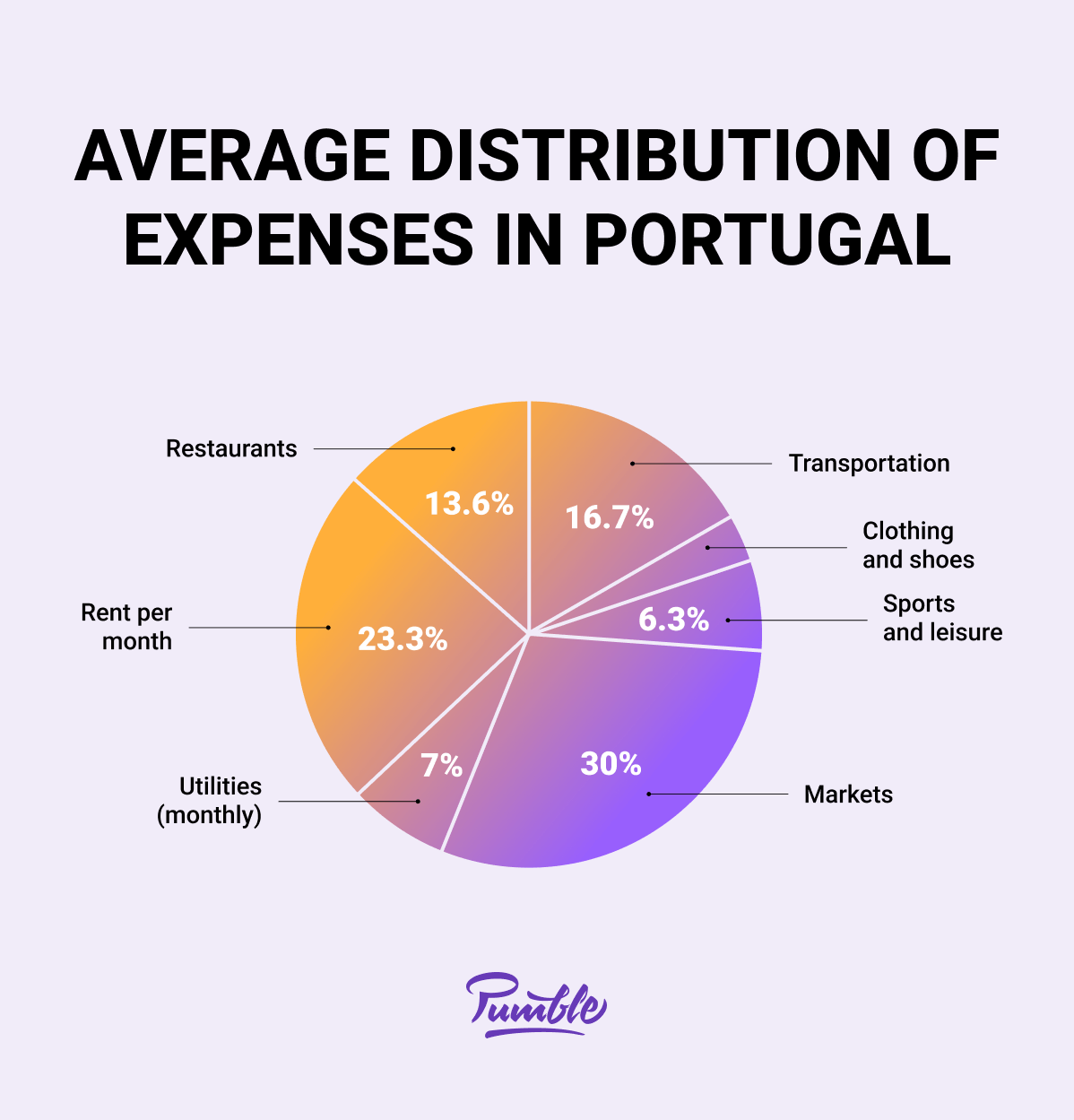
Of course, this number can vary depending on how much you like to eat out and where you buy your groceries.
Fresh produce and meat are especially cheap in big supermarkets as well as open markets, so pay attention to where you shop.
On average, you’ll have to spend:
- €0.76 (~$0.81) on milk,
- €1.16 (~$1.24) on bread,
- €5.73 (~$6.14) for a kilogram (~2.2 pounds) of chicken filets, and
- €9.37 (~$10.05) for a kilogram of red meat.
Expense #5: Restaurants, cafes, and bakeries
Portugal is famous for its delicious food. In fact, the Portuguese take their food quite seriously and take great care of not only which products they use but also of how they cook, plate, and present them.
So, Portugal has a lot to offer in terms of dining — from Michelin-star restaurants to hole-in-the-wall eateries.
Of course, although you’ll find life-changing dishes in both types of restaurants, the prices will differ.
A meal for two in an average or mid-range restaurant costs between €10 and €40 (~$10–$42), plus tips, which are optional. However, an outing to a high-end establishment can cost you several hundred euros.
A night on the town can also be either pricy or cheap — depending on how much you like to party. A bottle of beer costs around €2 (~$2.14), wine is €3 (~$3.22) for a glass and around €15 (~$16.08) for a bottle, while a cocktail can cost anywhere between €5 and €10 (~$5.3–$10.70).
Expense #6: Internet
The internet is fast and readily available pretty much everywhere in Portugal. As mentioned, your monthly internet bill won’t go over €40 ($42) per month.
However, pay close attention to the speed and availability of the internet when renting a place.
Although you’ll rarely see an apartment listing that doesn’t mention internet as an included amenity, some apartment listings will also have the type and speed of the internet connection listed in the ad.
Given how important it is to maintain a stable connection, that’s definitely something to keep an eye out for.
Expense #7: Coworking spaces
If you prefer to work from an office, you’ll also have the added monthly expense of coworking spaces.
Coworking spaces are the priciest in Lisbon. However, as Lisbon is the capital, it also has the biggest number of coworking spaces. Daily passes are between €15 and €25 (~$32–$42), while monthly passes are, on average, €146 (~$155).
Other cities, like Porto, Madeira Islands, and Algarve, all have lower prices when it comes to coworking spaces. However, they also don’t have as big of a selection. For example, you’ll probably be pressed to find a coworking space in tiny, rural towns like Ericeira.
Because coworking space is usually quite a big expense for digital nomads, we wanted to see just how big of an impact it can have on a digital nomad’s budget.
Luckily, one of our very own content managers, Ivana Fišić, spent some time in 2022 working and living in Porto, Portugal. We asked her to give us the inside scoop on the price of coworking spaces during her stay:

“The prices of coworking spaces in Porto are relatively cheaper than those in Lisbon. For example, you can find a spot for as little as €10 per day. Keep in mind that that price is without VAT, so the actual price is slightly higher.
Also, the daily passes don’t offer as much value for money as monthly passes do. Some coworking spaces don’t offer anything other than the daily and monthly passes. That’s pretty inconvenient for someone who came to Porto for two or three weeks, as I did.”
So, pay attention to the fine print and do your math before you decide which pass works best for you.
Do digital nomads pay tax in Portugal?
Taxes, like death, are inevitable no matter where you live. Therefore, being a digital nomad doesn’t exempt you from paying taxes in Portugal.
Of course, that only applies if you’ve spent more than 183 days in Portugal during the course of one year. Those 183 days don’t have to be consecutive, so keep that in mind.
If you have spent half a year in Portugal, you’re law-bound to pay income taxes both on:
- The income obtained in Portugal, and
- The income obtained abroad (if you obtained it in a country with which Portugal doesn’t have a double taxation agreement).
However, an advantage of the digital nomad visa is that it allows you to become an NHR or a non-habitual resident. That, in turn, allows you to take advantage of the NHR tax scheme.
The NHR program
There are only two requirements for the NHR program:
The NHR or the non-habitual residency program minimizes your income taxes. The program was introduced in order to entice pensioners, high-income professionals, and entrepreneurs to apply for tax residency in Portugal.
- Spend at least 183 days in Portugal during the year, and
- Provide proof that you haven’t been taxed in Portugal in the previous 5 years.
The NHR tax scheme can significantly lower the income taxes for the domestically obtained income to a flat rate of 20%. That means that if you earn €76,000 per year, your income tax will be €15,200 for the entire year.
Regular income taxes for residents of Portugal go up to 48%, which would mean that you’d be paying €36,480 in taxes on your 76 thousand income. So, the digital nomad discount you’ll be getting is quite hefty!
Aside from the flat domestic income tax rate, the NHR program has several other benefits:
- It exempts you from tax on income obtained abroad (provided the income comes from a country that Portugal has a double taxation agreement),
- It exempts you from paying income tax for real estate income, dividends, capital gains, and self-employment income (under the same double taxation law),
- It exempts you from paying the wealth tax,
- It provides a flat 10% tax rate on pensions.
Documents required for paying taxes in Portugal
When you arrive in Portugal, you’ll need to fill out a registration form with your local tax office in Portugal. You’ll have to do this before engaging in any professional activity.
This form can be obtained and filled out online.
Its purpose is to report to the tax authorities what type of activity you’ll be performing and which type of income you’ll be receiving for that activity.
The Portuguese authorities will calculate your expected tax, but you’re still expected to file a personal statement of Personal Income Tax every year.
Luckily, you can also do that online via the automatic IRS tax declaration service.
The Portuguese generally file their taxes between April 1st and June 1st every year. To submit the statement and pay the personal income tax, you’ll need to visit the Portugal’s Tax Authority website and log in with your NIF number.
What are the benefits of being a digital nomad in Portugal?
Sunny Portugal has always been a popular destination not only for tourists but also expats and retirees. Once they noticed this trend, the Portuguese legislature made sure to pass laws and introduce visas that will allow these groups of people to freely live and work in Portugal (and enjoy the benefits that come with that).
But, the various tax and residency schemes we previously talked about aren’t the only thing that’s motivating digital nomads to start calling Portugal their temporary home.
Even before the digital nomad visa was introduced, digital nomads flocked to Portugal. In fact, according to the Nomad List, Portugal has been one of the top 10 countries for digital nomads in the world and one of the two most popular ones in Western Europe for years.
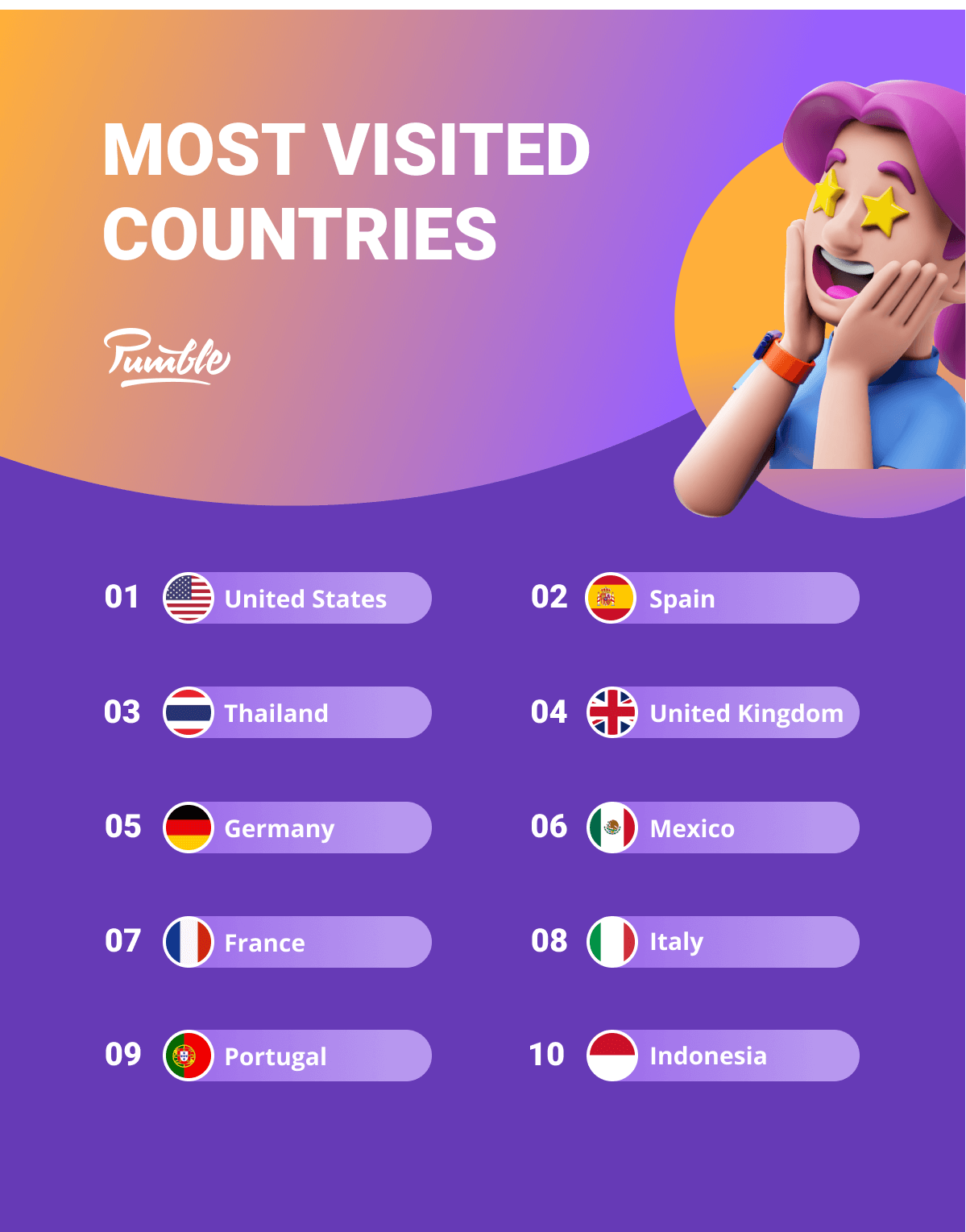
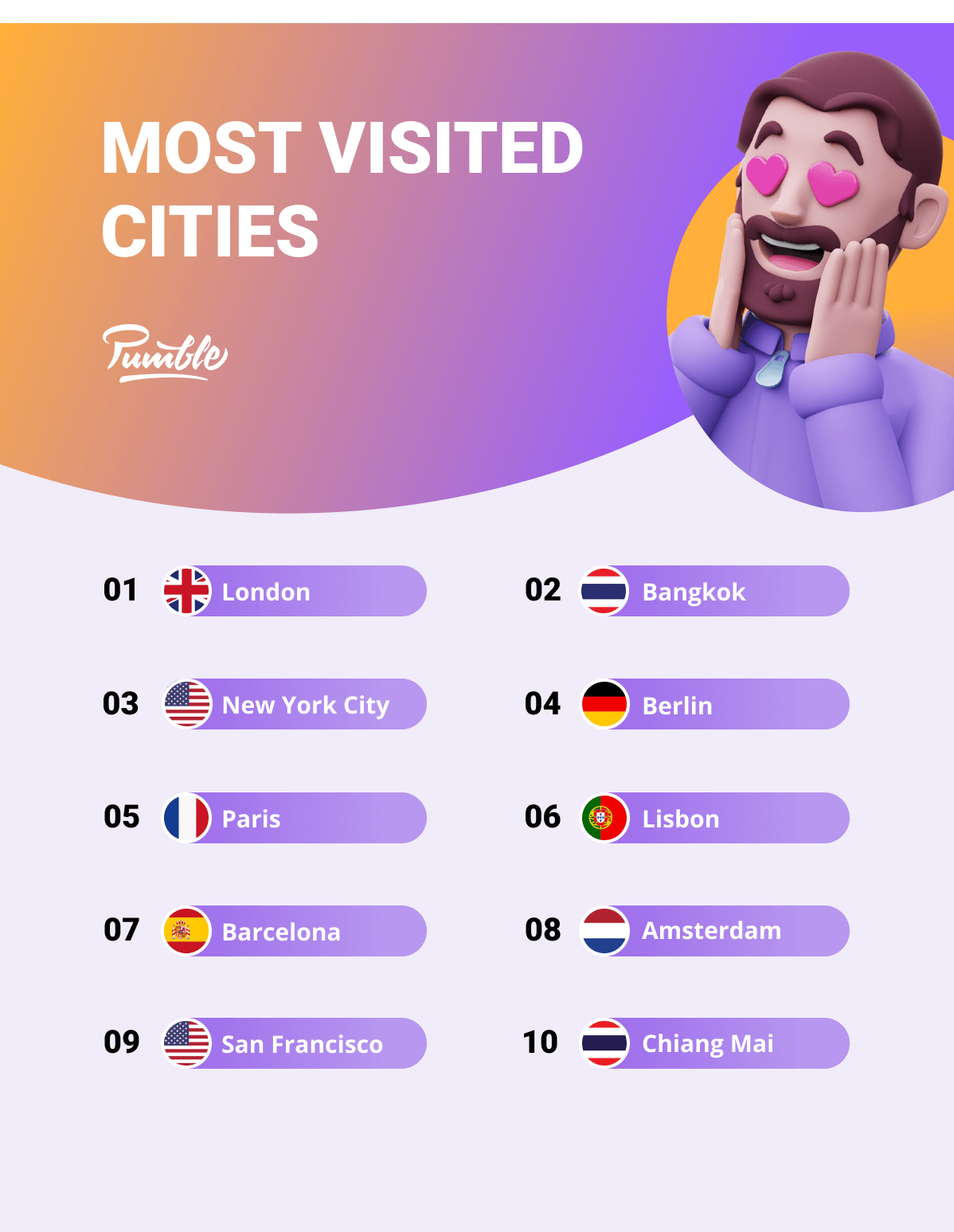
With the number of digital nomads rising globally (due to people refusing to go back to the office) and the introduction of the new Portugal digital nomad visa, it’s only logical that Portugal will see a higher number of digital nomads.
But, why does Portugal rank so high on the list of places to be (according to digital nomads)?
Let’s unpack this together, shall we?
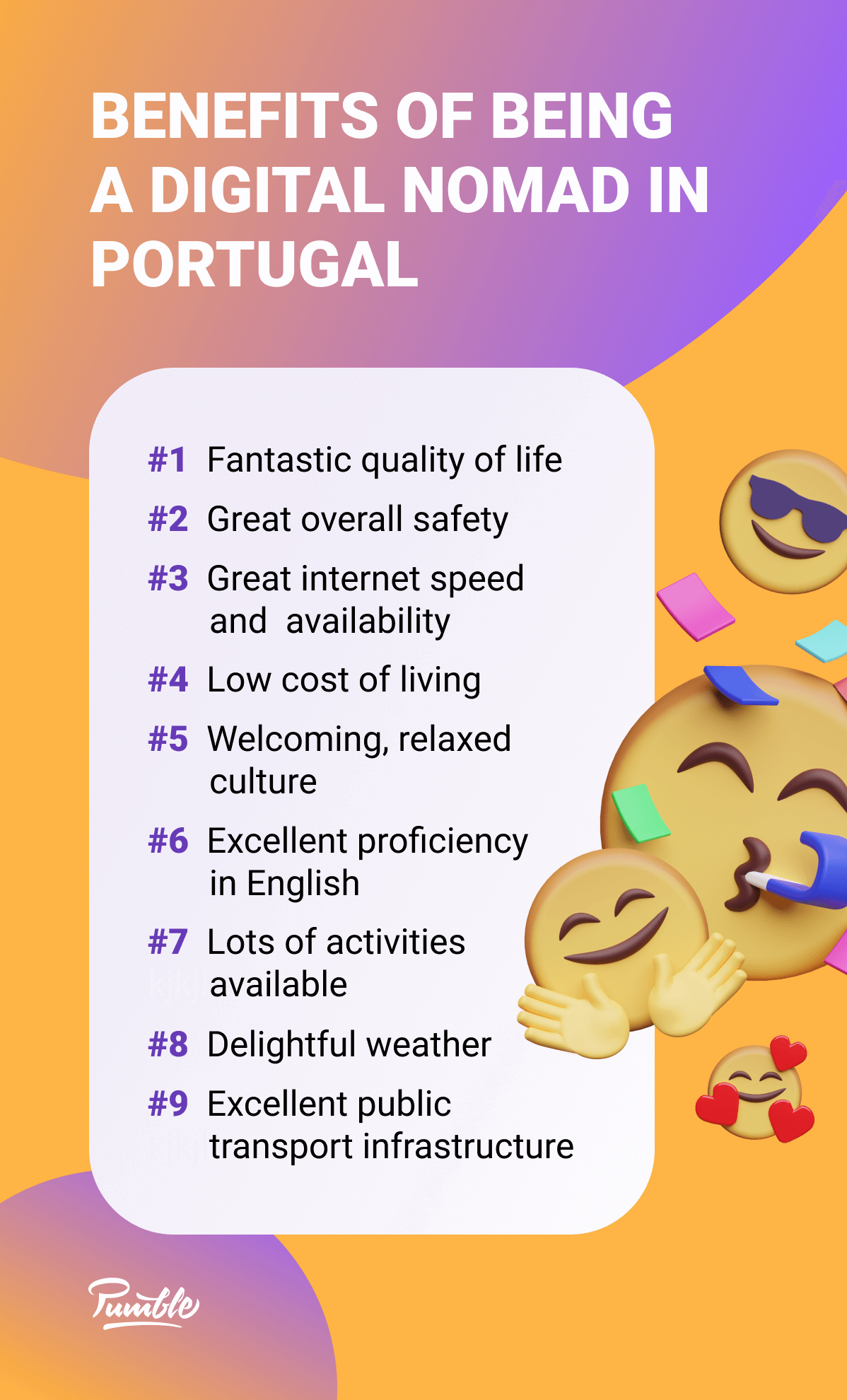
Benefit #1: Fantastic quality of life
Portugal is undoubtedly one of the dream tourist destinations that people want to spend their hard-earned vacations in.
However, unlike some, Portugal is also a great place to live year-round, which is what makes it so attractive to digital nomads.
Not only does Portugal have a lot to offer in terms of great food, welcoming locals, and sightseeing opportunities, but it also has excellent living conditions such as:
- Affordable and available housing,
- Public transport infrastructure,
- Job prospects,
- Well-staffed, affordable, and available healthcare facilities, and
- Affordable cost of living.
On the Better Life Index scale, Portugal ranks quite high in several dimensions.
It outperforms New Zealand in terms of housing conditions and spending, and it’s just behind Denmark in terms of income.
Overall, Portugal outperforms many countries when it comes to the quality of the environment and overall safety.
Benefit #2: Great overall safety
Portugal is one of the safest countries in the world. In 2021, it managed to rank 4th on the Global Peace Index scale.
That is a particularly important factor for digital nomads. When you’re living your life out of a suitcase, constantly traveling around without the support of family or a community, the safety of the place you pick to rest your head at is vital.
As one of the top five safest countries in the world, Portugal is clearly a great pick for digital nomads.
However, you’ll hear the same claim in many countries that score equally high and still find yourself being looked down upon or feeling threatened when you visit them.
That’s why we wanted to check whether these numbers had any merit in real life or not.
We asked our resident expert, Ivana Fišić, to give us her perspective on the general safety in Portugal. Here’s what she had to say:

“Walking through the streets of Porto, even alone, never felt unsafe. To a woman, being in an unknown place can be daunting, but Portuguese people are so welcoming and friendly that you instantly get reassured. It made wandering around town and exploring all the uphill streets more of an adventure and less of a dreadful experience.”
So, the numbers really don’t lie!
Extra safety benefit: LGBTQ+ friendly
It’s also important to note that Portugal ranks quite high when it comes to the progressiveness of the people.
With an amazing score of 96 out of 100 in terms of political rights and civil liberties, Portugal is one of the more progressive countries where you’ll rarely find yourself discriminated against, even if you’re a member of a minority. People of color as well as members of other minorities (like LGBTQ+ people) report that they feel rather safe in Portugal.
The ongoing efforts of the Portugal’s government to eradicate all forms of racially motivated discrimination, violence, and ill-treatment are commendable and set Portugal apart from some other European countries. But, Portugal still has some way to go in order to be a completely safe space for POC.
On the other hand, Portugal is quite LGBTQ+ friendly and has been for quite some time. They even forbade discrimination based on sexual orientation in their constitution way back in 2004.
According to Equaldex, Portugal scores quite high when it comes to LGBTQ+ rights:
- Discrimination is illegal,
- LGBTQ+ couples are allowed to marry and adopt children, and
- Trans people can legally change the gender in their documents.
Benefit #3: Great internet speed and availability
Aside from feeling safe, digital nomads also like Portugal because of its amazing internet availability.
Having a stable and readily available internet connection no matter where you go is imperative for everyone who’s working away from (their own) home or office.
Portugal has a high rate of high-speed internet availability. According to ANACOM (the Portuguese national regulatory authority for the communications sector) and Portugal’s National Statistics Institute, more than 4 out of 5 households across Portugal use fixed high-speed internet services.
The average internet speed in Portugal is 120 Mbps (median download speed) and 85 Mbps (median upload speed). However, depending on where you decide to rest your head (and plug in your laptop), you can get internet as fast as 1 Gbps.
The fastest (and most readily available) internet is in:
- Lisbon (96.6% internet penetration rate),
- Azores (91.1% internet penetration rate), and
- Algarve (86.6% internet penetration rate).
🎓 Pumble Pro Tip
Having a stable internet connection is imperative for remote work. An internet connection that keeps breaking can really impact your productivity (and profits).
But it takes more than just speedy internet to maintain satisfying productivity levels. If you’re looking to increase your productivity while working remotely, check out some of the tips from the following article:
Collaborate in real time to increase productivity — with Pumble
Benefit #4: Low cost of living
Another good thing about Portugal is that the fast internet that we’ve mentioned also comes quite cheap. Monthly costs don’t exceed €30–40 (~$32–42).
The great news is that the internet isn’t the only thing that’s affordable in Portugal. Generally speaking, Portugal has a low cost of living — when compared to the rest of Western Europe, Portugal ranks as the 2nd cheapest.
For example, the cost of living in Portugal is 27% cheaper than in France and 23.8% cheaper than in Germany (and that’s including rent).
However, it’s worth mentioning that the global economic crisis shook the Portuguese economy as well. Therefore, the prices (and, consequently, the cost of living) have increased slightly over the past year.
Nevertheless, when compared to the rest of the world, Portugal is still cheaper than 51% of countries.
If we’re talking about averages, a single person in Portugal spends around €1,423 (~$1,525) per month for groceries, rent, utilities, and other expenses, while a family spends around €2,833 (~$3,038).
Benefit #5: Welcoming, relaxed culture
If you’re used to the hustle culture, you’re in for a real shock. People generally have a relaxed lifestyle here, especially in popular vacation spots such as the Madeira Islands and the Algarve.
There’s a less hurried mentality in Portugal (that’s quite easy to get used to). In fact, the relaxed and laid-back approach to life is one of two key reasons millennial expats and digital nomads are drawn to Portugal (the second is, of course, the low cost of living).
However, just because people are relaxed doesn’t mean they won’t jump to your aid. The people of Portugal are not only friendly but also quite welcoming to strangers.
Ivana Fišić agreed and shared her personal experience:

“One of the highlights of my stay in Portugal were the people and their readiness to not only engage with but also assist strangers, especially if they seem lost. Even if they don’t speak English, they will try their best to help you find your way around. I had a situation at the post office where none of the employees spoke English, and they all banded together in order to figure out what I was trying to communicate to them and help me get what I need. They could have just turned me away but instead, they went out of their way to assist a foreigner.”
Benefit #6: Excellent proficiency in English
The Portuguese people speak English quite well, especially in big, tourist centers. Their proficiency ratings in 2022 are quite high — Portugal ranked 9th in the world when it comes to proficiency in English.
Furthermore, if you do happen to run into someone who can’t speak English (like it happened to Ivana at the post office), they’ll usually try their best to fetch a colleague or friend who can. So, people will do their best to help you and even go out of their way to accommodate your needs.
You can go by in Portugal without speaking a word of Portuguese. Most menus in restaurants are adapted for foreigners — you’ll often find a separate English menu in many establishments or at least a bilingual menu.
What’s more, many websites and apps that you’ll have to use during your stay (like those for banking, for example) have an English version.
However, it’s worth mentioning that Portuguese people appreciate the effort foreigners make to speak their native language. So, learning a few words and phrases in Portuguese might make you more likable.
Not to mention, knowing the language enough to make yourself independent and self-sufficient while grocery shopping and paying the restaurant bill is a great asset for any digital nomad.
🎓 Pumble Pro Tip
Communication can be problematic even when both participants share a native language. In a work environment, proper, effective communication is vital for success. But, as luck would have it, communication is particularly tricky when all team members are working remotely (some might even be working from Portugal, wink-wink). So, check out how you can improve your communication skills by overcoming the common communication challenges:
Keep the communication going — try Pumble
Benefit #7: Lots of activities available
No matter where you end up residing in Portugal, you’ll have plenty to do once you close your laptop for the day.
As a coastal country, Portugal offers a lot of water-based activities that you can enjoy, like:
- Kayaking in Benagil, Lagos, or Albufeira,
- Boat tours on river Lima or Douro, or along the coast,
- Cruises from Lisbon, Funchal, Porto, or Ponta Delgada,
- Speed boating on pretty much any beach, and
- Dolphin and whale watching in the Azores.
Aside from that, you can always:
- Do guided city tours,
- Go hiking,
- Explore caves,
- Go skydiving,
- Go on a vineyard tour that includes wine tasting, or
- Take horseback riding lessons on a beach.
Portugal has so much to offer that you’ll never have to wonder, “What should I do?”. Instead, you’ll only have to ask yourself, “What should I do NEXT?”.
Benefit #8: Delightful weather
Just like anything else, the weather you’ll experience in Portugal depends on where exactly in Portugal you are.
However, on average, Portugal has wonderful weather. With 260 sunny days in the year and an average temperature that doesn’t go below 9°C or 48°F (ever), Portugal is one of the warmest Western European countries. But that doesn’t mean the sun shines year-round.
Portugal has a Mediterranean climate, which means the winters are mild. However, it also sadly means they are rainy. Of course, northern parts of the country have lower temperatures and more rain, but you’ll often get wet even in the south. Lisbon and Algarve, for example, have milder weather than Porto, but still see around 112 rainy days every year.
Still, the weather in Portugal is overall much more pleasant than in other parts of Europe, given that Portugal is the westernmost country in Europe and as such, has the warmest climate.
Another great thing about Portugal is the air quality. According to the EEA’s European city air quality viewer, two of Portugal’s cities rank 2nd (Faro) and 3rd (Funchal) on the list of cities with the highest quality of air.
Portugal, in general, has quite good air quality. What’s more, Portugal is also quite environmentally conscious. It was one of the first countries to include provisions in its constitution that regulate and guarantee the protection of the environment.
It currently ranks 27th most environmentally friendly country in the world on the EPI (Environmental Performance Index).
Benefit #9: Excellent public transport infrastructure
Portugal has an excellent infrastructure, which isn’t that surprising, considering it’s a massive tourist hub.
You can explore cities in Portugal by:
- Metro (in Lisbon and Porto),
- Bus,
- Train, and
- Trams (again, only in Lisbon and Porto).
If you’re staying in Portugal for a while, it would be smart to utilize the discounts that the transportation system offers.
For example, a tram ride will only cost you €1.5 (~$1.6) instead of €3 (~$3.22) if you have a 7 Colinas or a Viva Viagem Card. These magnetic cards can be validated in buses and trams.
A similar system exists for trains. The Portugal Rail Pass offers significant discounts for both kids and adults. There are two types of tickets available — 3-day and 7-day tickets, where you’re able to use the railroad that connects the north and the south of Portugal for either 3 or 7 days per month.
Even without a rail pass, you can still ensure you get a discounted price when traveling by train. All you have to do is book your ticket in advance. If you do so at least a week before your trip, you can expect a 50–65% discount.
What’s more, the amount of money you pay for a ticket depends on your departure spot and your destination.
For example, trains aren’t just intercity. You can also use them to move around Lisbon, Porto, and other big cities. Of course, that will cost you significantly less than a Lisbon–Porto ticket.
So, make sure to not only book but also calculate the price of your train ticket in advance.
| Region | Bus | Train | Tram | Metro |
|---|---|---|---|---|
| Lisbon | – Single ticket €2 (~$2.15) – Monthly pass €40 (~$42.75) | – Single ticket €1,35–€75 (~$1.45–80) – No monthly pass | – Single ticket €1.5–€3(~$1.6–3.2) – No monthly pass | – Single ticket €1.50 (~$1.6) – Monthly pass €40 (~$42.75) |
| Porto | – Single ticket €1.25 (~$1.3) – Monthly pass €30 (~$32) | – Single ticket €1,35–€75 (~$1.45–80) – No monthly pass | / / | – Single ticket €1.25 (~$1.3) – Monthly pass €30 (~$32) |
| Algarve | – Single ticket €1.85 (~$2) – Monthly pass €50 (~$53.5) | – Single ticket €1,35–€75 (~$1.45–80) – No monthly pass | / / | / / |
| Coimbra | – Single ticket €1.60 (~$1.7) – Monthly pass €30 (~$32) | – Single ticket €1,35–€75 (~$1.45–80) – No monthly pass | / / | / / |
What are the drawbacks of being a digital nomad in Portugal?
Although Portugal is not only dreamy but also downright ideal for digital nomads, it isn’t without its flaws.
Let’s take a look at some of the drawbacks.
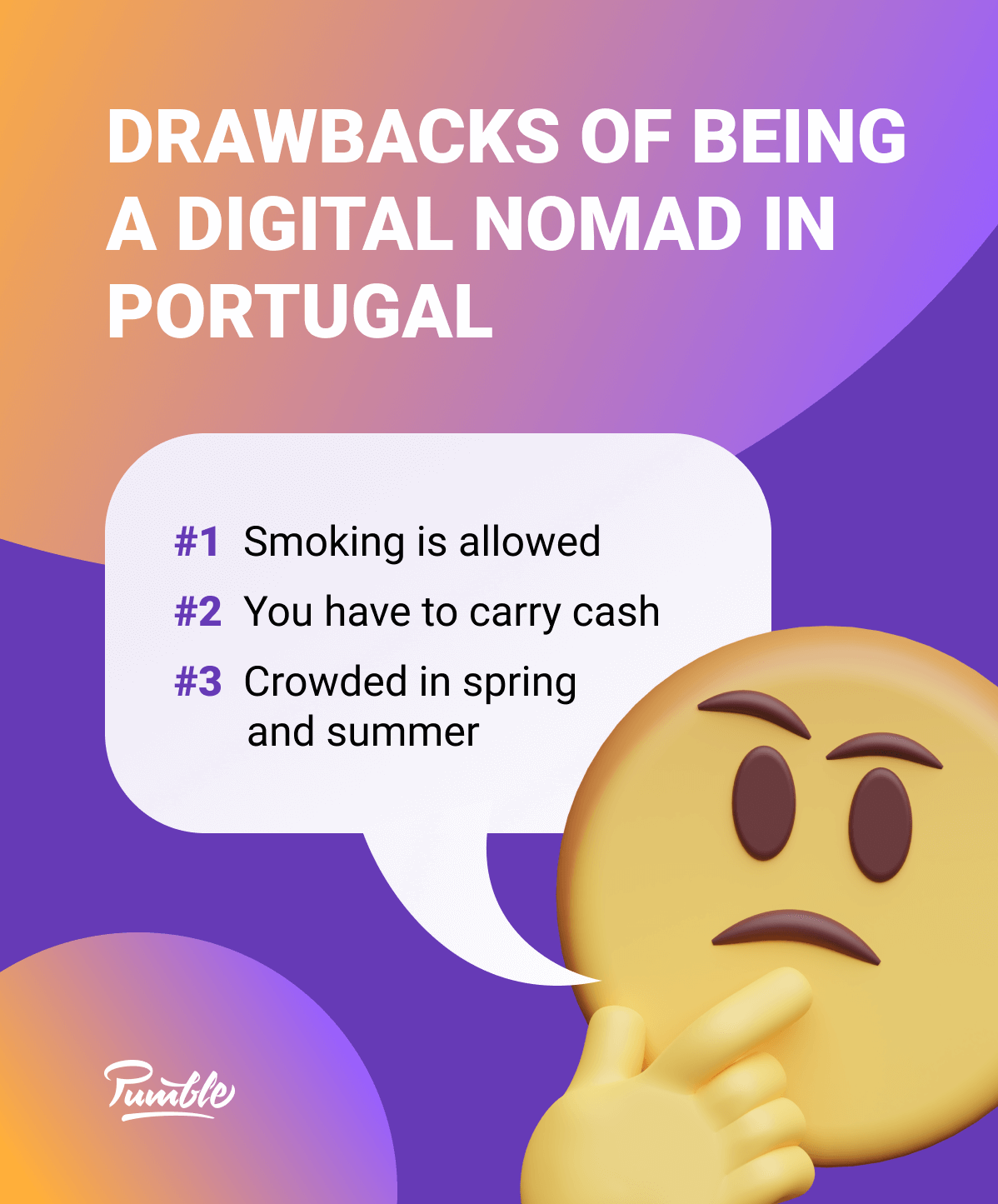
Drawback #1: The language barrier can prove difficult
Although Portuguese people don’t really struggle with English, the language barrier still exists.
You’ll easily find someone at the grocery store to help you find the exact cheese you’re looking for, and the waiter will have no issues with taking your order in a restaurant.
However, when it comes to integrating into a society, the language barrier can pose a real issue.
Language is essentially our most significant tool for integrating a community. Thus, many digital nomads who come to Portugal (or any other place) with the intention of staying there for a while, have trouble feeling a part of the community.
🎓 Pumble Pro Tip
Communicating with people who don’t speak the same language as you do can be especially challenging in a work environment. If you’re struggling to talk or explain yourself to your colleagues who come from different backgrounds, check out our tips on cross-cultural communication:
Boost communication in distributed teams with Pumble
Drawback #2: Getting into a good routine can be hard
If Portugal is your first-ever digital nomad destination, keep in mind that maintaining a work-life balance in a picturesque country like Portugal can be difficult.
To be frank, maintaining a routine and holding yourself accountable is difficult as-is. However, when you have Portuguese natural wonders one train or bus ride away, it becomes increasingly more difficult.
Portugal is always brimming with new people, exciting opportunities for exploring, and interesting happenings. Staying focused on your work can be quite hard in that environment.
🎓 Pumble Pro Tip
By definition, digital nomads work remotely. And, although most of them have a good system in place that helps them achieve their daily, weekly, and monthly goals, it’s always good to see what can be improved from time to time. So, if you’re looking to refresh your remote working system, check out the best tools for remote workers we reviewed in the following article:
Drawback #3: Digital nomad starting costs can pile up
Although Portugal is quite affordable, traveling around it and exploring can make a huge dent in your wallet. The starting costs that every digital nomad has when they arrive at a new destination can pile up if you frequently change locations.
If you’re wondering why we’re mentioning that, it’s because we know how much Portugal has to offer. Trust us, you’ll arrive in Lisbon and start exploring. Then you’ll hear about the Madeira Islands and want to visit for a quick cruise. After that, you’ll see the Algarve archipelago and think to yourself, “You know, it’s really only a train ride away, I could quickly relocate.”
And, although you’d be right (it is just a train ride away), frequently traveling from place to place can become quite costly, even in a cheap country like Portugal.
So, make sure to prioritize.
Digital nomads often deal with FOMO. And although most have the fear they’re missing out on stuff at home, a lot of nomads are also afraid they won’t get to “see everything” in the city or country they are visiting.
The reality is that you can’t “see everything.” You can only see so much while also maintaining a healthy balance between your work and free time.
🎓 Pumble Pro Tip
Do you need help setting work-life boundaries? If you often find yourself working after hours or constantly thinking about your job, you might be in desperate need of some work-life balance. That’s especially true for any (aspiring or current) digital nomad. So, check out our tips below:
Set better work-life boundaries with Pumble
Drawback #4: Smoking in public places is common
One of the massive culture shocks that most North American and North European nomads experience has to do with smoking in public places.
Although Portugal forbids smoking indoors, smoking outdoors is not only allowed but also quite common. You’ll often try to blissfully enjoy your morning coffee in a cafe garden only to find yourself in a cloud of cigarette smoke.
Drawback #5: Picking the right place to stay can be a challenge
When making the decision where to set up their temporary camp in Portugal, most digital nomads often face a similar dilemma:
- Do I stay in a rural area that has a lot to offer in terms of sightseeing and is cheap, or
- Do I pick something a bit more centralized that’s more expensive?
Although this dilemma might seem easily solvable (just pick the area you like the most or the cheapest option if you’re on a budget, right?), it’s actually a massive conundrum.
Why?
Well, think of it this way — that amazing apartment you found in Tavira, Algarve has a great ocean view and, if you go in December, you’ll have the whole town to yourself since there won’t be any tourists, right?
Right.
However, accommodations in small tourist centers and summer spots usually don’t have some of the amenities that places in big cities have.
For example, houses and flats in small towns that are popular summer destinations don’t have proper heating that will keep you warm during those rainy December nights. They also often don’t have great insulation.
On the other hand, staying in places like those will probably be very healthy for your wallet (unless you go during high season, of course).
Thus, a conundrum.
Drawback #6: It’s crowded in spring and summer
No matter where you go in Portugal during spring and summer, you’ll probably see a lot of tourists.
Aside from being a digital nomad haven, Portugal is also an extremely popular tourist destination. According to Portugal’s National Statistics Institute, in 2021, 9.6 million tourists visited Portugal. What’s more, they didn’t just sit around on beaches. Instead, they made a staggering 17.5 million trips all over Portugal.
So, if you plan on staying in Portugal during the warmer months, expect crowds everywhere (especially in popular, tourist-friendly spots). What’s more, you can also expect slightly higher prices for short-term rentals, field trips, and even groceries (in some areas).
Drawback #7: Some places only take cash
Although you can easily get by with cards in big cities like Lisbon and Porto, if you venture into rural areas, you’ll often find small mom-and-pop shops that only take cash.
That isn’t such a huge drawback for digital nomads from Europe who are usually well accustomed to using the euro. But, it can be a slight nuisance for North American nomads who are wired to think in dollar amounts and are more used to using cards than handling cash.
5 Best destinations for digital nomads in Portugal
So far, you’ve learned how to get to Portugal and regulate your legal status there (by obtaining a digital nomad visa) as well as why Portugal is potentially the country of your digital nomad dreams.
Now that you’re (probably) dying to pack your bags and visit Portugal, let’s take a look at where you could potentially go.
As mentioned, Portugal is full of quaint places that will take your breath away. And, although we’d gladly list them all, we had to limit ourselves to the top 5 destinations that are the perfect fit for digital nomads.
Let’s see what they are.
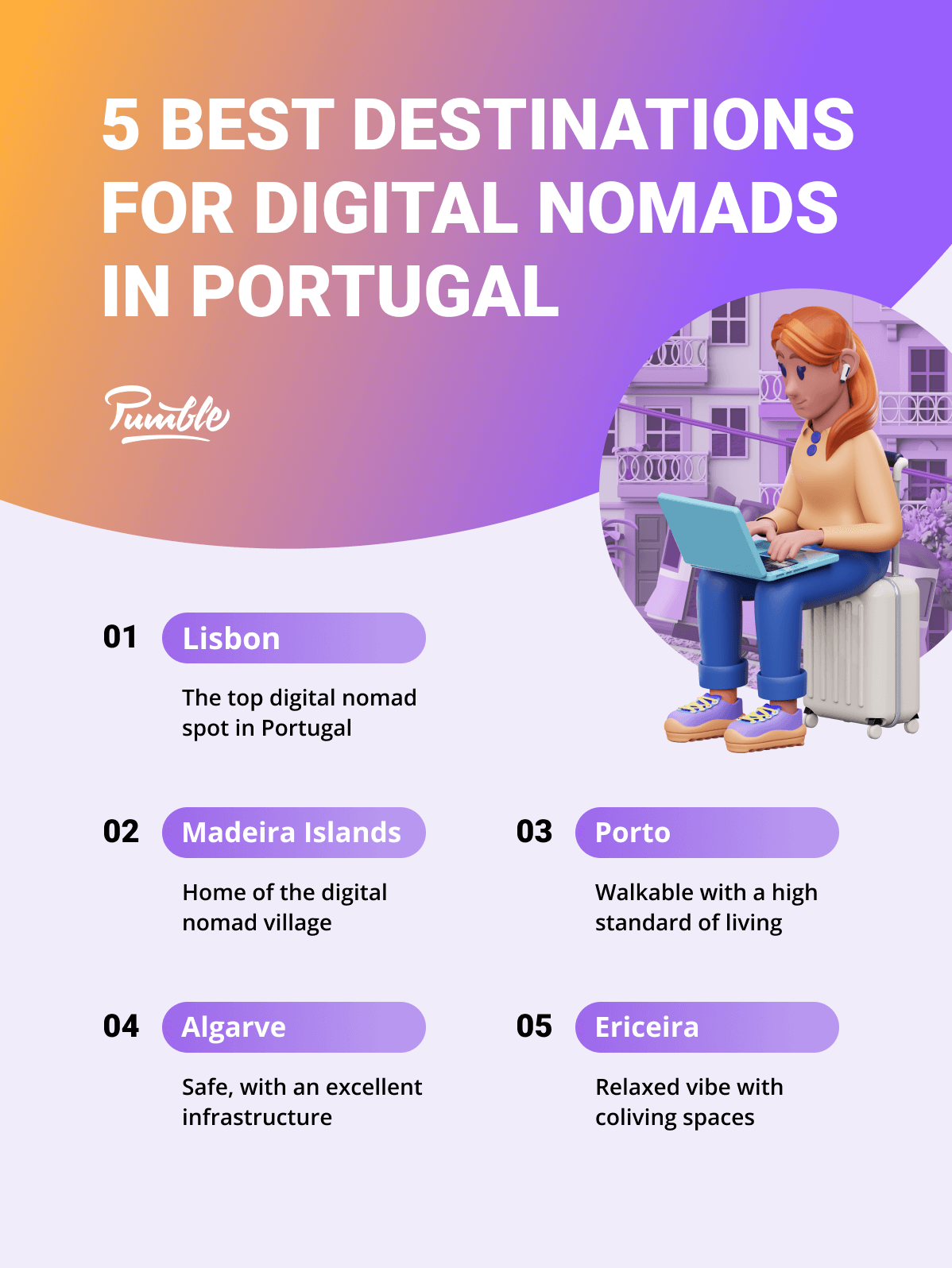
Lisbon — best for those who like coworking spaces
Population: 544,851
City area: 38.63mi² (100.05 km2)
Time zone: GMT (GMT+1 in the summer)
Average internet speed: 125.94 Mbps (median download speed), 84.00 Mbps (median upload speed)
Average cost of living: €2,324 (~$2,490) per month for a family of four, €658 (~$705) per month for a single person (rent not included)
Average rent: €1,000—€1,500 (~$1,070—$1595) per month for a one-bedroom apartment outside of the city center
Biggest advantage: A huge expat and digital nomad community
Biggest drawback: High cost of living
As the Expat Insider City Ranking report from 2022 states, Lisbon ranks as the 4th best city in the world for expats and digital nomads. It has an approval rating of 82–86%, which is quite high.
Lisbon is welcoming to foreigners and quite safe. However, compared to the rest of Portugal, housing can be quite difficult to find. What’s more, since Lisbon is the capital, it also has the highest cost of living index and rent price index.
But, the further you move away from the city center, the lower the rent prices get. Some of the great (and not-as-pricy) neighborhoods in Lisbon are:
- Chiado,
- Bairro Alto,
- Principe Real,
- Alfama,
- Penha de França,
- Alcantara, and
- Belem.
If you’re looking to experience everything that Lisbon has to offer but would rather not give an arm and a leg for rent, you can also try some of the surrounding cities. Cascais, Sintra, and Almada are gorgeous towns that are quite close to Lisbon (15 to 30 minutes) — but significantly cheaper.
Where to work in Lisbon
There’s a total of 84 coworking spaces in Lisbon and the highest rated one, according to Google, is the Avila Spaces — Business Center & Coworking. With 215 reviews, this coworking space has an impressive ranking of 4.5 stars.
Madeira Islands — best for those who like a hidden gem
Population: 253,945
City area: 309.27mi² (801 km²)
Time zone: GMT (GMT+1 in the summer)
Average internet speed: 103.26 Mbps (median download speed), 79.41 Mbps (median upload speed)
Average cost of living: €1,940 (~$2,080) per month for a family of four, €542 (~$580) per month for a single person (rent not included)
Average rent: €700 (~$750) per month for a one-bedroom apartment outside of the city center
Biggest advantage: The digital nomad village
Biggest drawback: Isolated
With a subtropical climate that means plenty of sunny days during the year (practically year-round), Madeira is the best island destination in Europe.
However, there’s more than just sunny weather that makes the Madeira archipelago attractive to digital nomads. Madeira is also the home of the first ever digital nomad village.
A one-stop-shop for digital nomads, this village offers pretty much everything one nomad might need — from advice and a helping hand all the way to high-speed internet and co-working spaces.
But that’s not all! An island completely ready to cater to the modern workers, Madeira also has a startup incubator.
Madeira is a great place for foreign workers, as the majority of the locals speak English and there’s nearly 100% internet coverage on the entire archipelago.
The best and most famous spots on the Madeira archipelago are Ponta do Sol and Funchal.
Where to work in Madeira Islands
There are 10 coworking spaces in Madeira and the highest rated is the Homeoffice Madeira | CoWorking + CoLiving spot that has a high ranking of 5 stars, based on 115 reviews.
Porto — best for those looking for a relaxed vibe
Population: 214,349
City area: 16mi² (41.42 km²)
Time zone: GMT (GMT+1 in the summer)
Average internet speed: 118.79 Mbps (median download speed), 87.59 Mbps (median upload speed)
Average cost of living: €2,165 (~$2,320) per month for a family of four, €612 (~$655) per month for a single person (rent not included)
Average rent: €700 (~$750) per month for a one-bedroom apartment outside of the city center
Biggest advantage: You can walk everywhere
Biggest drawback: Colder and rainier than Lisbon
Even though it’s not as bright and sunny as Madeira or as big of a city as Lisbon, Porto is still a favorite among digital nomads.
Thanks to its lower cost of living, slower pace of life, and lively nightlife, Porto is an amazing alternative to Lisbon for everyone who likes the best of both worlds.
People are even more relaxed in Porto than they are in the rest of Portugal and the entire city exudes history. Historical architecture is in full view no matter where you look (and it’s protected by the government!)
Where to work in Porto
With over 20 coworking spaces in the city center alone, Porto is a dream come true for anyone who likes the rent-an-office system. The highest-rated space is Synergy Coworking, which has a rating of 4.9 stars based on 153 reviews.
The Algarve — best for those who like the summer vibe
Population: 438,406
City area: 1,929mi² (4,997 km²)
Time zone: GMT (GMT+1 in the summer)
Average internet speed: 93.99 Mbps (median download speed), 60.56 Mbps (median upload speed)
Average cost of living: €1,700 (~$1,820) per month
Average rent: €1,000 (~$1,072) per month
Biggest advantage: A lot of foreigners
Biggest drawback: Foreigners may be putting upward pressure on the prices
According to the National Statistical Institute of Portugal, the Algarve houses the largest number of foreigners in Portugal. That’s quite impressive, given that their overall population is only a bit over 400,000. It’s also a massive benefits for digital nomads, because it means that they will have no trouble fitting in, given that they’ll be practically surrounded by other nomads.
The Algarve region is also the most popular destination in Portugal. The towns with the highest rate of tourists are:
- Lagos,
- Faro,
- Albufeira, and
- Portimao.
The Algarve region generally has a good healthcare system and infrastructure. However, it does get quite crowded in the summer, given how popular of a vacation destination this area is.
On the plus side, the Algarve region has the 3rd highest internet penetration rate in all of Portugal, so digital nomads are able to work practically from anywhere.
Where to work in the Algarve region
The Algarve region is quite spread out, so you might have to travel quite a bit from one coworking space to the next. However, if you’re looking for the highest-rated one, that’s Faro Avenida. With 75 reviews, that space earned a ranking of 4.5 stars.
Ericeira — best for those in love with the small-town vibe
Population: 10,260
City area: 4.7mi² (12.19 km²)
Time zone: GMT (GMT+1 in the summer)
Average internet speed: 146.56 Mbps (median download speed), 102.92 Mbps (median upload speed)
Average cost of living: €1,000–€1,500 (~$1,072–$1,605) per month with rent
Biggest advantage: Walkable small town
Biggest drawback: Quite small with limited number of coworking spaces
The smallest town on our list is Ericeira. This up-and-coming small town on the western coast of Portugal is slowly but surely becoming the hottest digital nomad destination in Portugal.
Ericeira is a small town, which means it exudes that charming, small-town energy. It’s completely walkable, which is a great thing given that the public transport within the city isn’t the best. However, Ericeira is well-connected to Lisbon, which is only 40 minutes away.
Ericeira is also quite cheaper than Lisbon or any of the surrounding towns (like Sintra and Cascais, for example). With an average cost of living between €1,000 and €1,500 (~$1,072–$1,605) per month including rent, Ericeira is an ideal place for any penny-pinching digital nomad.
Where to work in Ericeira
Although Ericeira only has four big coworking spaces, they are quite cheap, especially compared to those 40 minutes away in Lisbon. The best rated coworking space is SUNAGO Coliving & Coworking House that has a rating of 5 stars based on 75 reviews.
Tips for digital nomads in Portugal
Being a digital nomad means living a delightful yet frightening existence. Digital nomads have more freedom and excitement in their lives but are usually more than willing to sacrifice pretty much anything else that will help them maintain their lifestyle.
Finding your way through an unknown country and trying to land on your feet (all the while keeping up with your work and maintaining productivity levels) is definitely a hard task.
That’s why we prepared some additional tips that will help you find your way in Portugal!
Tip #1: Use the time difference to your advantage
Digital nomads from the Northern Hemisphere particularly enjoy the time difference because it allows them to connect with their colleagues on the other end of the world, while still leaving enough time during the day for leisure.
Our expert, Ivana Fišić chimed in on that topic:

“The ultimate highlight of my first trip to Portugal was the fact that the days are long. I was there in May and June, and I was able to take advantage of the fact that it gets dark pretty late. That left me with more time at the end of a work day to explore and wander around Porto. It helped me maintain a work-life balance during my short-term stay and not feel as if I’m missing out on anything.”
Tip #2: Connect with other digital nomads and expats
Connecting with strangers is difficult but it’s also one of the vital survival skills of any digital nomad. When you’re out there on your own, having someone who knows what you’re going through is essential.
The massive community of foreigners in Portugal is pretty tight-knit, ready to lend a helping hand, and willing to embrace any digital nomad. So, lean into that.
Tip #3: Pay attention to the availability of wifi
If you’ve been planning on taking a Lisbon—Porto train ride, make sure you do all your work before you board the train.
The wifi rarely works on buses and trains, so don’t count on working throughout your journey. Instead, sit back, relax, and enjoy the gorgeous views of Portugal.
Or, you know, hotspot your laptop from your phone.
Tip #4: Don’t be afraid to bargain
Although haggling culture isn’t really a thing in Portugal (not as much as it is in some other places), that doesn’t mean you shouldn’t try to negotiate.
If you’re booking accommodations for a long-term stay, try to talk with the owner-provider and haggle on the price. It usually works!
Further reading for digital nomads in Portugal
Although we gave it our all to make this Portugal digital nomad guide as all-encompassing as possible, we simply can’t fit everything onto a single page.
But, don’t worry! We prepared some additional sources for you.
- If you’re interested in watching a few videos of expats and digital nomads who work and live in Portugal, check out the following channels: Expats Portugal Community and Traveling With Kristin.
- If you’re looking for a community of digital nomads, try searching through the following sites: Nomad List, NomadX, ExpatsPortugal, and The Nomadic Network.
- On the Nomad List, you’ll find some interesting statistics about each digital nomad-worthy spot in not only Portugal but also the world.
Keep your team united with Pumble — Even from Portugal!
As you prepare to commence your digital nomad adventure in Portugal, you’ll quickly realize that ensuring seamless communication with your team is essential for success.
Luckily, with Pumble, you can overcome the challenges of distance and maintain strong connections no matter where your journey takes you.
Pumble is a team communication app that provides a comprehensive suite of features tailored to enhance team connectivity, including:
- Direct messaging,
- Channels,
- Threads,
- Customizable notifications,
- Video conferencing,
- File sharing, and many more!
With Pumble on your side, you can navigate all of Portugal without missing a beat in your team collaboration. Embrace the freedom of remote work, knowing that Pumble empowers you to stay productive and connected no matter where you roam.
Enjoy seamless connectivity from anywhere in the world — make a Pumble account today!
Portugal digital nomads visa guide disclaimer
We hope this Portugal digital nomad visa guide has been helpful and that you enjoyed reading it. Throughout the guide, we have given you various links that might lead you to new interesting data or simply to articles that will expand your knowledge on various Portugal-related topics.
Please bear in mind that our article has been written in Q1 of 2023, so any changes that are made in the Portugal digital nomad visa procedures or laws after that time have not been included.
Before you start the application process, we advise you to consult with certified representatives, lawyers, and institutions that can provide you with all the information needed.
Pumble is not responsible for any negative responses, losses, or risks incurred, should this guide be used without further guidance from legal and other official advisors.
How we reviewed this post: Our writers & editors monitor the posts and update them when new information becomes available, to keep them fresh and relevant. Published: March 10, 2023
Published: March 10, 2023 





